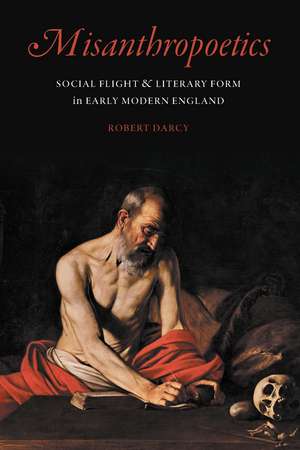Misanthropoetics: Social Flight and Literary Form in Early Modern England: Early Modern Cultural Studies
Autor Robert Darcyen Limba Engleză Hardback – 31 dec 2020
In Shakespeare’s England a burgeoning urban population and the codification of social controls drove a new imaginary of revolt and flight in the figure of the literary misanthrope. This figure of disillusionment became an experiment in protesting absurd social demands, pitting friendship and family against prudent economies, testimonies of durable love against erosions of historical time, and stable categories of gender against the breakdown and promiscuity of language.
Misanthropoetics chronicles the period’s own excoriating critique of the illusion of resolution fostered within a social world beleaguered by myriad pressures and demands. This study interrogates form as a means not toward order but toward the impasse of irresolution, to detecting and declaring the social function of life as inherently incongruous. Robert Darcy applies questions of phenomenology and psychoanalysis, deconstruction and chaos theory to observe how the great deployers of literary form lost confidence that it could adhere to clear and stable rules of engagement, even as they tried desperately to shape and preserve it.
Preț: 509.68 lei
Nou
Puncte Express: 765
Preț estimativ în valută:
97.54€ • 101.46$ • 80.52£
97.54€ • 101.46$ • 80.52£
Carte tipărită la comandă
Livrare economică 14-28 aprilie
Preluare comenzi: 021 569.72.76
Specificații
ISBN-13: 9781496222626
ISBN-10: 1496222628
Pagini: 282
Ilustrații: 1 illustration, index
Dimensiuni: 152 x 229 x 25 mm
Greutate: 0.59 kg
Editura: Nebraska
Colecția University of Nebraska Press
Seria Early Modern Cultural Studies
Locul publicării:United States
ISBN-10: 1496222628
Pagini: 282
Ilustrații: 1 illustration, index
Dimensiuni: 152 x 229 x 25 mm
Greutate: 0.59 kg
Editura: Nebraska
Colecția University of Nebraska Press
Seria Early Modern Cultural Studies
Locul publicării:United States
Notă biografică
Robert Darcy is a professor of English at the University of Nebraska at Omaha.
Cuprins
Acknowledgments
Introduction: Definition at the Limits of Form
1. Models Not to Copy: Timon of Athens, Knowledge, and the Performance of the Misanthrope
2. Midas’s Food: Paternity, Incest, and the Renaissance Economy in The Merchant of Venice and Pericles
3. Retreats of Despair and Devotion: Choice, Faith, and Exile in Book 4 of The Faerie Queene
4. “Put This in Latin for Me”: Alienated Speech and Phenomenological Discourse in Ben Jonson’s Epicoene
Epilogue: Pygmalion’s Image and Misanthropoetics in Coda
Notes
Works Cited
Index
Introduction: Definition at the Limits of Form
1. Models Not to Copy: Timon of Athens, Knowledge, and the Performance of the Misanthrope
2. Midas’s Food: Paternity, Incest, and the Renaissance Economy in The Merchant of Venice and Pericles
3. Retreats of Despair and Devotion: Choice, Faith, and Exile in Book 4 of The Faerie Queene
4. “Put This in Latin for Me”: Alienated Speech and Phenomenological Discourse in Ben Jonson’s Epicoene
Epilogue: Pygmalion’s Image and Misanthropoetics in Coda
Notes
Works Cited
Index
Recenzii
“A fascinating and valuable topic, and one that has not been previously well studied. The figure of the misanthrope and his relationship to and flight from society is well worth exploring. Darcy writes with great fluency and wit.”—Alan Stewart, co–general editor of The Encyclopedia of English Renaissance Literature
Descriere
Misanthropoetics explores efforts by Renaissance writers to represent social flight and withdrawal as a fictional escape from the incongruous demands of culture.
















